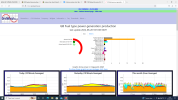The background information about how the wholesale electricity market works here is exceptionally interesting
@RichardAsh1981 - could you recommend some resources for learning more about it?
A good question with a lot of complexity hiding underneath it! Many of the industry documents which govern the system are in the public domain, either as legislation or various industry "codes" (
https://www.nationalgrideso.com/industry-information/codes) but these are far from easy to understand unless you are a specialist in the field.
The label for the arrangements I attempted to summarise is "New Electricity Trading Arrangements" (as introduced in 2001) then renamed as "British Electricity Trading Transmission Arrangements" in 2005.
The Government's "Review of electricity market arrangements" consultation document (July 2022) has an attempt at a 1-page summary of the current system on page 23:
https://assets.publishing.service.g...00/review-electricity-market-arrangements.pdf but it's not great (the list of all the additional features added on top of the 2001 system to try and achieve the subsequent desired outcomes is notable!).
Dieter Helm (and economist) was commissioned in 2017 to produce a Cost of Energy Review, which is well written in that you do not need to be an economist, or energy specialist, to understand it. Page number 80 would be the relevant section for electricity generation costs (the railway does quite a bit of it's own distribution of power, so does not pay all of the distribution costs discussed)
https://assets.publishing.service.g...nt_data/file/654902/Cost_of_Energy_Review.pdf Dieter does however have Views (not very complementary about the historic or current system!), and pre-dates the massive rises in gas costs we have seen since 2020. he continues to independently publish at
http://www.dieterhelm.co.uk/ but that is probably a side track.
For statistics (like how much generation capacity we have, and what fuels are used over the year), honorable mention to the Office for National Statistics "Digest of UK Energy Statistics (DUKES)":
https://www.gov.uk/government/stati...est-of-united-kingdom-energy-statistics-dukes (but this is a retrospective compilation of data, so don't expect it to tell you anything about 2022!).
The Energy Systems Catapult (government-funded academic research body) has produced "An Introductory Guide to the GB Energy Industry: Chapter 2 – Electricity Market Structure and Statistics"
https://es.catapult.org.uk/guide/th....com/2021/08/GB-Energy-Industry-Chapter_2.pdf (You'll need to fill a form out to download the PDF). It's rather thin at 8 pages, and probably not worth the faff. It was authored by Cornwall Insight, who are worth knowing about.
Most of the predictions (broadly accurate as it turned out) for changes to the retail price cap quoted in the media have been from Cornwall Insight
https://www.cornwall-insight.com/. They are market analysts and you pay for the good stuff, but they do have some free stuff on their website, and if you sign up for their newsletter you get to see more. I know plenty of people in the energy industry do, they have a reputation for knowing their stuff.


